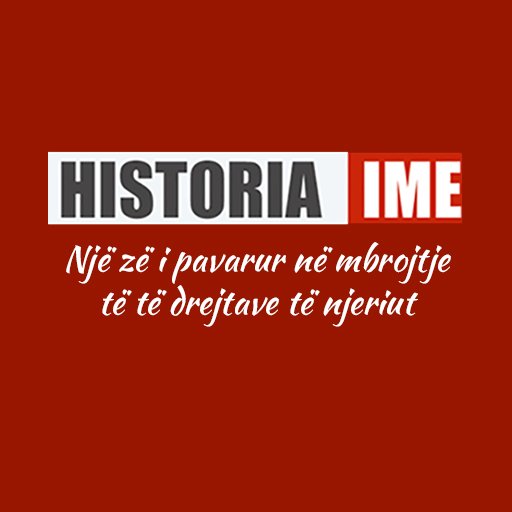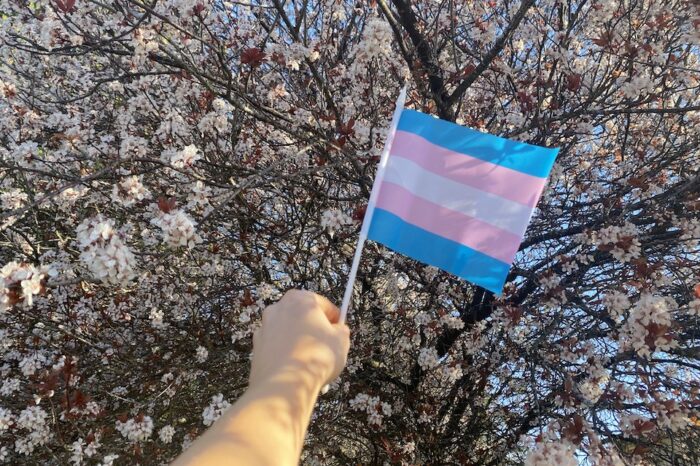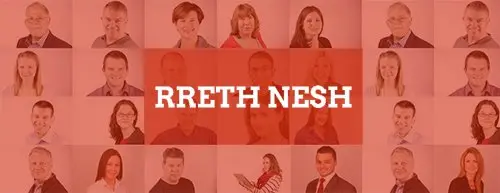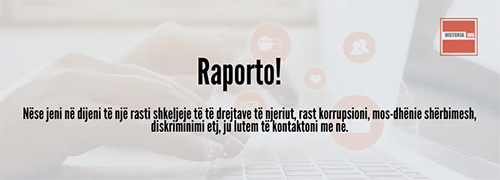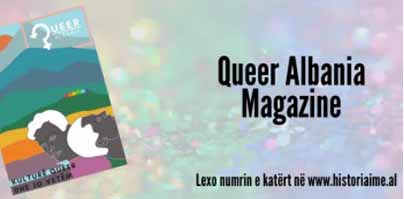Why the narrative of LGBTI+ reports should shift? It is time to oppose and not praise the government

Kristi Pinderi

Most of the reports dedicated to the situation of the LGBT community in Albania, – reports coming from the civil society organizations especially from 2012 up to 2017, – have consistently highlighted some perceived positive achievements. As a leader of the Albanian LGBT movement, I can give a first-hand testimony for the reason why we have adopted a generally favourable and positive narrative on our reports during 2012-2017: it has been a political tool, a leverage we have used in order to advance the implementation of the law and as such it has been a pure and clear strategy.
For instance, in 2010 Albania adopted a progressive anti-discrimination law. Sexual orientation is one of the specific potential grounds of discrimination that this law addresses. Furthermore, the law identifies also gender identity as a prohibited ground for discrimination. Sexual orientation was not a new ground for discrimination in the European legislation but in 2010 Albania was one of the few European countries to have gender identity too, thus directly protecting the trans population.
In our reports which have been echoed by the media, both the Albanian and the international media we have praised the politicians for adopting that legislation. The reason was strategic: we believed that the work had not ended with the adoption of the law, it had just started, and we needed to build communication and collaboration bridges with the institutions in order to ensure its IMPLEMENTATION!
For this reason, in almost all the reports (including all Human Rights Reports issued annually by the State Department) you will find a narrative praising the adoption of the law followed immediately by a sentence or group of sentences that almost always start: “However, the law enforcement remains week”.

Erion Veliaj visiting the Shelter in 2015
The same logic was used in 2015 when we launched a residential shelter for young homeless LGBT people in Tirana. We invited the then Minister for Social Welfare Mr ErionVeliaj (currently the Mayor of Tirana) to visit the shelter and to somehow let him take some of the credit for that unique service we had just launched. The government had done nothing for the very challenging project to establish the residential shelter, but that did not stop the minister to take his media crew, film his visit and distribute the material in order to get some credit especially among the international community.
We were aware of it, but we did not stop that from happening because we considered that moment as an opportunity to bring the government on board, to make the government aware of the issues faced by the LGBT community and thus to somehow make it more sensitive to our cause. We genuinely believed (and we still believe) that in order to positively change the things you must have on board not only the civil society but also the government or local institutions, the potential donors and the community itself. Unfortunately, although the Shelter has started its 4th year of existence none of the public and/or state agencies including the government has ever supported it either financially or through other means.
In 2016 we tended to have a similar narrative when the government adopted a National Action Plan. We praise that action because we thought it was an opportunity to change the things for better. Nevertheless, in 2017 the government abolished the Ministry of Social Welfare who was responsible for implementing that Action Plan (most of its task is now under the responsibility of the Ministry of Health and there it is extremely difficult to follow up and to identify now who is responsible for what in terms of the Action Plan). That plan itself is now a completely forgotten issue that is being raised occasionally by the LGBT organizations whenever there is a public event or any other platform to do so.
For this reason, we need to push in order to have a shift in the narrative of reports and external communication and instead of focusing (or praising) whatever the government promises to do, to give the full space and priority only to the needs of the LGBT community and to the challenges it is facing.
Right now Pro LGBT, Alliance Against Discrimination and the Shelter are on their final touch and editing a report that details all issues relevant during 2018, including data, numbers and statistics that reveal the dramatic reality of the LGBTI+ community: what is their access to justice; in what level does this community face with physical and psychological violence; how many have experienced discrimination, how many have abandoned the school because of threats and bullying; how many have been kicked out of their homes or have been domestically violated; how many have reported the violence to the Police; how many have used the Anti Discrimination law; and finally how all these people have been treated by the Police and public agencies?
Access to justice
According to a recent study done by United Nation Development Program (UNDP) in Albania to tackle the issue of access to justice for marginalized groups it turns out that the LGBTI+ community is one of the most vulnerable groups when it comes to access to justice (the others being the Roma community, low-income people, people with disabilities and women facing domestic violence). The main instrument to identify the main issues in this study was a survey completed by 1750 responders but to further investigate issues related to the LGBTI+ people this survey was combined with several focus groups with LGBTI+ community.
Understandably, it turns out that people who have come out to their families or friends are facing more violence than those who are living double lives. This is directly connected to systemic homophobic perceptions and attitudes from the broad public. According to the study of UN, 37.4 % of Albanian citizens believe that the employer should be able to fire any LGBTI+ person if the employer is not comfortable with their employee’s sexual orientation or gender identity.
“Lack of protection from violence is still a systemic issue within the Police and the justice system”, says this report.
The members of the LGBTI community are strongly convinced that they are being persecuted within the police stations and the police are either ignoring and don’t care about their fate or are visibly treating them as an enemy.
“Went to Police to file a report after I had a fight with 6 young men”, is quoted in this report a young gay man saying. “But when I was leaving the Police station, I heard one of the policemen saying to my perpetrators: “Never mind, you did well. You must declare that you were intoxicated with alcohol as this will be used as a justification for your action”. I was shocked”, the quoted person says, “and from that moment I can never trust the Police”.
Other participants in this study confirmed that it is a common modus-operandi for the Police to verbally denigrate and harass whomever LGBTI+ person dares to file a report. “How is it possible”, says a responder in the focus group quoted by UN, “that whenever someone else is complaining about us the Police is so quick to show up, but whenever someone from us (the LGBTI+ community) is complaining they never show up?”.
The Alliance Against Discrimination was able to document during 2018, 421 cases of reported discrimination and psychological and physical violence like: insults, labeling, malicious gossips, humiliations in the street by strangers, denying service in bars, gyms or grocery shops and physical violence from clients (in case of sex workers) or from homophobic strangers in the street. According to the documentation done by Alliance in 2018, it turns out that from 421 cases only 5 of them have decided to report: 3 have filed a report at the Police and 2 more cases have asked the Commissioner for Protection from Discrimination to follow up. None of these cases has been followed up. When asked to provide a copy of the report filed in the Police, these 3 people were denied such a copy raising a serious question if the police have even recorded and accepted their reports.
Access to health service
Alliance Against Discrimination has been accompanying 11 transgender and 3 young gay men to the health clinics. The reason why this information is important is because the Alliance is forced to accompany them only when they are refused to be served. That means that at least 14 people were denied access to health service during 2018. Usually, the doctors and nurses will not refuse them if a staff member from the organizations is walking with them in the clinic.
Abandoning the school as an escape from violence
The Alliance, the shelter and Pro LGBT have served overall to 734 people from the LGBTI+ community (in the shelter, in the daily social centre and through the online helpline SOS LGBT) and among this number, 3 % reported to have abandoned the school because of bullying and violence.
The last official data of school abandonment within the general public was 0.4 of children doing that. This means that the LGBTI+ community is around 10 times more likely to abandon the school, equal in numbers only to the Roma Community that is a visible minority in Albania.
One of the most problematic cases that have been followed by Alliance during 2018 was the case of a high school student in Vlora, an important city in South West of Albania. This student was being violated almost on daily basis inside the school because of his perceived sexual orientation. The Alliance reports graphic details: “He was beaten, punched, hands were put on his throat to prevent him from breathing and he was insulted every day from his peers. The only measurement to protect him taken by the school administration was to isolate him during the lunch bread inside the janitor room where his peers could not reach him. When the school director was asked why they don’t call the Police she answered that: we cannot call the Police for such cases!”.
Homelessness and domestic violence
From the end of 2014 when we opened the residential shelter (it was fully operating in 2015) we have directly realized how serious is the issue of domestic violence faced by the LGBTI+ community. In 2018 the shelter has assisted 15 members of the LGBTI+ community.
What is more alarming is not only the inability to live openly as LGBT+ but the increasing violence inside two places commonly considered as the safest places for human beings: home and school. As I will show you below with two concrete examples, unfortunately, I have come to the conclusion that LGBT+ risk their lives in homes and school as much as they risk in the streets!
On February 2nd, 2018 I had to write an article about a dear friend and activist who was found hanged in his room in Tirana. He was together with us while we organized the first pride event in Tirana in 2012. We were only 9 people. We never understood the real reasons (if there is any reason to kill yourself) but we knew his problematic relationship with his family members.
In my daily work and in several documented cases I have seen that the LGBTQ+ community is constantly facing physical violence because of their gender identity and/or sexual orientation. Those members of our community who cannot hide their non-binary gender identity or sexual orientation, are disproportionally affected not only by street violence but also by domestic violence, unemployment and refusal to offer equal rights and opportunities.
An underreported challenge is also the difficulty for them to rent an apartment or house, even in cases when they can fully afford the costs. The broad stigma and the general wrong perception especially for the transgender people (especially trans women) is that they are sex workers.
Domestic violence, both in capital Tirana and/or in remote small towns remain the biggest challenge. From the end of 2014 (officially from 2015) that we opened the residential shelter, as mentioned more than 67 young people have been protected in it, all of whom facing domestic physical and psychological violence.
Usually, the violence came from family members such as older brothers and even from fathers and mothers. At the residential shelter, we had to deal in 2015 even with the case of a 16 years old boy that was disowned by his parents who signed a declaration in front of the public notary to give up their parenthood responsibilities towards their child.
People who are associated with the LGBTI community are also facing the same discrimination and risks.
Albania does not recognize either same-sex marriage nor same-sex partnerships. Although same-sex marriage is broadly not considered a human right, recognition of same-sex partnerships are considered as crucial. This is true especially in the light of the case Orlandi and Others v. Italy.
The European Court for Human Rights emphasised that member states were free to choose whether to accept same-sex marriages or not; however, the states are obliged to guarantee same-sex couples’ legal recognition and protection.
Most of the policies that have a clear social and economic impact in Albania are based upon the family. But having in mind that LGBTI families in the country do not have any kind of legal recognition by the state these families are excluded from any policy that might have a clear economic and social impact.

